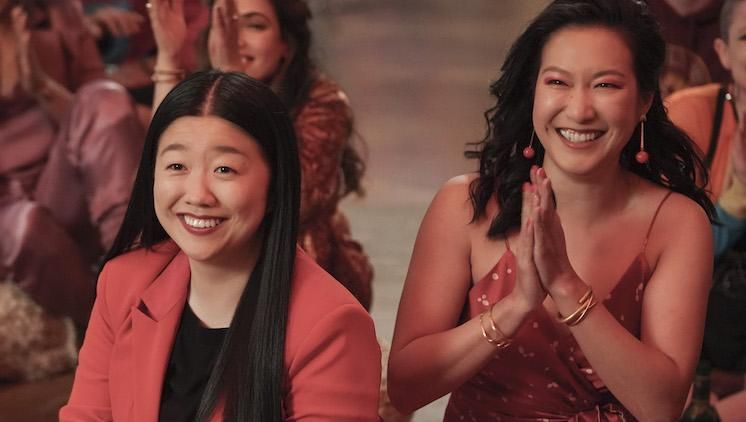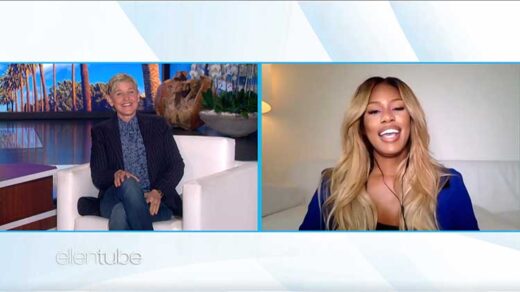Good Trouble’s Sherry Cola has a challenge for TV viewers: “Name another show right now that features a love story between two Asian women.” While there may be some other depiction of queer Asian women couples in American TV right now, a quick scan of couples doesn’t reveal another. The point is that those love stories are criminally underrepresented, and the evolving romance between Cola’s Alice and her ex-girlfriend Sumi (Kara Wang) is just one of the myriad ways the Freeform series is centering Asian culture and narratives. The most recent episode featured Alice hosting her family’s Lunar New Year celebration at the Coterie, the communal living space she manages where the central characters of Good Trouble reside. It turns out that the episode was more than entertainment. It made Cola feel seen.
“I’ve never felt so liberated as Sherry in all of my identities,” Cola, who is bisexual, tells The Advocate. Essentially I’m Chinese-American, and I’m a woman. And all these things are things that society never rooted for, but I’m fully embracing and celebrating them now.”
“I’ve never felt so whole — 100 percent me— in my life, and it really is thanks to Good Trouble as well, because I’m so proud of the show, I’m a fan of the show. It’s really taught me to use my voice. Alice is doing the same now, which is really beautiful to see because we’ve seen her grow, we’ve seen her evolve so much in three seasons, and now she’s standing up for what’s right and fighting for what she believes in.”
With its signature equal parts humor and heart, the Lunar New Year episode depicts a frantic Alice attempting to please her traditional parents. who appear to favor her brother. Peppered throughout the episode are nods to the traditions and “superstitions” of Lunar New Year that Cola attests exist — Alice needs rice balls, not the more porridge-like desert her friend and Coterie flatmate Davia (Emma Hunton) accidentally picks up. When someone attempts to clear the kitchen the morning after, Alice advises it’s bad luck to clean at the New Year. And when Josh Pence’s Dennis turns up in the morning with a fresh haircut, Alice chides him. It’s bad luck, she says.
“Being on TV, we’re here to entertain, but at the same time to shed light on corners of cultures that the audience doesn’t know,” Cola says. “I grew up with Lunar New Year; it is the biggest holiday. I go to the Buddhist temple with my mom at midnight every single year. This is something I grew up with — all these little superstitions, all these little details of, no cutting your hair on the New Year … or just eating that whole fish [another scene in the show] is so important to the entire holiday.”
“The fact that we showed the lion dance [a traditional dance to bring good luck] on mainstream American TV just means so much,” Cola adds.
For much of the show’s third season, Alice has faced off against stereotypes, especially in her comedy workshop, where the program’s head peddles in low-hanging fruit and culturally offensive material. He pushed her to employ a stereotypical accent in her sketches, and she pushed back, risking her standing in the workshop widely viewed as a launchpad for comedy careers. Still, the timing of the Lunar New Year episode carried extra meaning when the cast shot it in March at the apex of the anti-Asian hate that fomented earlier this year.
“It was so emotional because we started the process of the Lunar New Year episode at the end of March 2021 in the midst of the anti-Asian hate crimes. It was such a real experience to be able to share my culture in this way with all those things going on,” Cola says, adding that showrunner Joanna Johnson and director Erica Dunton gave her space to make a speech Alice delivers to her family and her Coterie chosen family her own.
“That really was Sherry speaking from the heart, because of all the things going on and because of the fight for the community,” Cola says.
As for Alice and Sumi’s enduring fondness for one another (they share a kiss at the close of the celebration despite Sumi’s having a partner), Cola says there’s a shared experience that has bonded them over three seasons. In a previous episode, Alice and Sumi are the targets of stupid bro antics at a bar where the men stereotype them based on their being Asian, women, and queer. The bar scene becomes fodder for Alice’s big sketch with her comedy program.
“That’s what happens to a lot of Asians — people always assume things of us because they’ve only seen a certain stereotypical version of us on TV and movies for so long,” Cola says. “So now we’re redefining that and kind of reclaiming our identity because we’ve been defined by others for so long.”
“This isn’t some throwaway casual kiss,” she says of Alice and Sumi’s reconnection. “This is a layered history of a relationship for three seasons, and it’s finally coming full circle because they realize how much they mean to each other.”
“I’m pinching myself because I’ve never seen this on TV. I challenge everyone to name one other TV show that portrays love between two Asian women.”
Cola, a rising star in the comedy world, is sure to remind folks that the character Ruby (Shannon Chan-Kent), who works with the comedy workshop and with whom Alice hooked up with a few times, is also still in Alice’s romantic orbit. She’s jubilant to point out that Good Trouble features three queer Asian women.
“It’s a damn Asian woman love triangle,” Cola says. “Good Trouble is representation on 100. Good Trouble is that bitch — it leaves no one out. I feel so seen. And I’m the one doing it.”
“I hope this is a step in the right direction and I hope everyone sees this as an example to tell stories that are real because this is my life. This is Sherry’s life on the screen,” Cola says. “So many times in the past, they’re like, Oh, wait, two Asian girls dating. That’s too many Asian girls. Three, no way. But this is real life. And we’re truly showing it on the screen in a real way. I’m so proud.”






